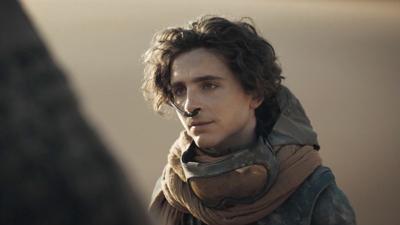The success of Denis Villeneuve’s recent adaptations of Frank Herbert’s classic 1965 sci-fi novel Dune has been interesting to me, because the tone and atmosphere of the story are rather bleak. The action and battle sequences are restrained and less flashy than most blockbusters, and the characters aren’t the most endearing. Maybe after a decade of the traditional optimism within the Marvel Cinematic Universe- and Star Wars-related projects, audiences are looking for something a bit different for cinematic entertainment. If so, it appears that Dune (2021) and now Dune: Part Two prove that major studio releases can be both exciting and serious.
Following where the first movie left off, exiled heir Paul Atreides (Timothée Chalamet) and his mother, Lady Jessica (Rebecca Ferguson), lay low with the Fremen community while the troops of Paul’s enemy, Baron Bladimir Harkonnen (Stellan Skarsgård), are on the hunt for the Fremen. Tribe leader Stilgar (Javier Bardem) believes Paul fits all the signs of the next Messiah to end the global wars between royal houses, while Paul just wants to fight alongside the Fremen to defeat Harkonnen. Meanwhile, Jessica is pushed into becoming the next reverend mother of the Fremen, while Paul finds love with wary soldier Chani (Zendaya), and Harkonnen’s unhinged nephew, Feyd-Rautha (Austin Butler, is up for challenging Paul to a fatal duel.
Florence Pugh, Josh Brolin, Dave Bautista, Charlotte Rampling, Léa Seydoux and Christopher Walken round out the all-star cast. While the first part of Dune got an impressive reception amid the pandemic plus a dual streaming release, Dune: Part Two is already predicted to be the first big hit of 2024. It says a lot that viewers are interested in watching the arc of a protagonist who is essentially the anti-Neo or anti-Luke Skywalker. He’s reluctant to become a leader, and when he does take up the position, it’s out of revenge more than the greater good.
Paul is probably the closest to an anti-hero that a major franchise can get. Naturally, there have been accusations of Dune’s writing coming across as anti-religion, as well as specifically being similar to Islam practices (i.e., the fictional foreign language spoken between the characters sounds Arabic-inspired). But I think Herbert, Villeneuve and co-screenwriter Jon Spaihts might actually be saying something deeper than just “religion is bad,” and maybe suggesting you can’t force someone to be the Chosen One. It can only happen organically.
Part Two concludes with an open ending, following reports of Villeneuve and company planning to return to adapt Herbert’s 1969 followup novel, Dune: Messiah. In general, the Dune series leaves me a bit cold narratively, and I don’t find many of the characters very intriguing. The second part of the initial story visually does have much more action and choreography compared to the dialogue-heavy Part One, and the cast is fantastic. So, it sounds like after the lackluster initial 1984 adaptation by David Lynch, longtime fans of Herbert finally have the most appropriate filmmaker to bring the epic tales to life on screen.


